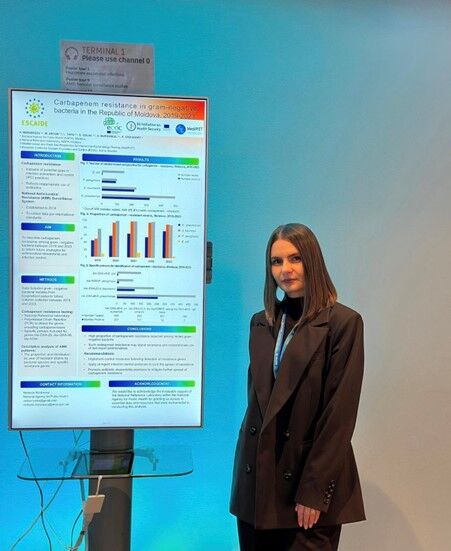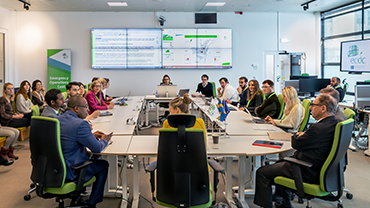Tackling Antimicrobial Resistance in Moldova: An interview with Nadejda Morarescu
Nadejda Morarescu is a public health specialist at the National Agency for Public Health in Moldova. She holds a degree in Public Health and completed her residency in Epidemiology. Her work focuses on antimicrobial resistance (AMR), healthcare-associated infections, and infection prevention and control. As a MediPIET fellow, she led projects on AMR surveillance and stewardship, deepening her expertise and commitment to public health.

What inspired you to focus on antimicrobial resistance (AMR) surveillance in Moldova, and why is this issue particularly important for the country?
I chose to focus on AMR surveillance because in Moldova, an increasing number of inpatients are developing infections that no longer respond to the usual antibiotics. This is not just a laboratory problem — it affects real people, real families, and everyday health care. For example, recent national data showed that 94% of Acinetobacter baumannii and 62% of Klebsiella pneumoniae strains in hospitals were resistant to carbapenems, which are among the strongest antibiotics we have.
These bacteria often cause serious infections in people who are already hospitalised, especially in intensive care units. When antibiotics stop working, patients may stay in the hospital longer, treatments become more expensive, and sadly, some people die because no effective antibiotic is left.
In Moldova, AMR is especially difficult to tackle because of several challenges: doctors sometimes overprescribe antibiotics, people often take them without a prescription, hospitals don’t always have strong infection prevention measures, and quick diagnostic tools aren’t always available.
Surveillance helps us understand where the problems are, spot warning signs early, and take action both locally and nationally. That’s why I see AMR surveillance not just as a technical task, but a vital way to protect public health in Moldova.
Can you explain, in simple terms, what your project aimed to achieve and how it contributes to improving public health in Moldova?
My project aimed to evaluate how Moldova monitors AMR. We’ve been seeing more cases of bacteria that don’t respond to last-resort antibiotics, so it was important to understand how the national surveillance system is working — what’s going well and where we can improve.
We worked closely with the national reference laboratory and spoke with key professionals responsible for reporting resistance data. We also looked at how the data is collected and shared. The project revealed some important gaps and showed that Moldova needs an electronic reporting system to replace the current paper-based one, clearer performance indicators, and broader participation from labs across the country.
Improving AMR surveillance will help Moldova respond faster to threats, make better public health decisions, and protect antibiotics for future generations. It’s a step toward a stronger, more responsive public health system.
What were some of the main challenges you encountered while evaluating the AMR surveillance system, and how did you address them?
We found that while the AMR surveillance system was generally accepted and flexible, it faced important challenges. The biggest was the continued use of paper forms for reporting, which slows down the process and increases the risk of errors. Also, some lab staff had difficulty adapting to new procedures and needed more technical support.
To tackle these challenges, we worked closely with lab professionals, gathered feedback through surveys, and proposed practical solutions, such as introducing an electronic reporting platform and providing better staff training. These changes are aimed at making the system faster, more accurate, and more reflective of the real situation across the country.
How do you envision the recommendations from your project impacting the future of healthcare and disease prevention in Moldova?
The recommendations from our project are focused on making Moldova’s AMR surveillance system stronger and more efficient. By introducing an electronic reporting platform and better-quality data, healthcare workers will have quicker, more reliable information to guide treatment decisions. This will help prevent the spread of resistant bacteria, protect patients, and keep antibiotics effective for the future.
If resistant bacteria aren’t controlled, even common infections could become untreatable, leading to longer hospital stays, higher costs, and serious health risks or death. It could also make routine medical procedures more dangerous. Expanding laboratory participation and standardising procedures will provide a clearer, more complete picture of resistance patterns across the country. That way, health authorities can spot threats early and take action. Overall, these improvements will support safer healthcare and a healthier population in Moldova.
Did you have a chance to discuss your ideas on AMR surveillance improvement with experts from other countries?
Yes. One of the highlights of my MediPIET fellowship was the technical visit to the Robert Koch Institute (RKI) in Germany, where I gained first-hand insight into how a well-established national system monitors antimicrobial resistance and antibiotic consumption. At RKI, I engaged in a valuable exchange of experiences and best practices on how AMR data is collected, analysed, and used to guide public health decisions in a structured and integrated manner. I was particularly impressed by Germany’s comprehensive One Health approach—collaborating across human health, animal health, and environmental sectors to create a holistic understanding of antimicrobial resistance. Discussions with experts from RKI, as well as with representatives from the CAESAR network, (network of national antimicrobial resistance (AMR) surveillance systems and includes all countries in the WHO European Region) deepened my understanding of how important it is to link antibiotic use data with resistance trends—and how international collaboration can help countries build stronger national systems.
This experience broadened my perspective and gave me the confidence to bring back practical knowledge to Moldova. I now feel better equipped to contribute to strengthening AMR surveillance and reporting in my country, ensuring that our efforts align with international standards and that we move toward a One Health model in practice, not just in theory.
Reflecting on your experience with the MediPIET fellowship, how has this opportunity influenced your professional growth and perspective on public health? What would you like to work on in the future?
The MediPIET fellowship has been a major milestone in my career. It gave me practical skills in field epidemiology - like tracking outbreaks, analysing health data, and responding quickly during emergencies. I also learned how important ethics, clear communication, and teamwork are in public health.
Working with colleagues from other countries was very inspiring. It gave me new ideas and showed me different approaches to solving problems. Through this experience, I gained a stronger understanding of how crucial collaboration is in protecting public health.
Looking ahead, I want to continue growing professionally, help improve disease prevention systems and support the next generation of specialists. I hope to achieve even more in the field I’ve chosen and help improve healthcare for everyone.







